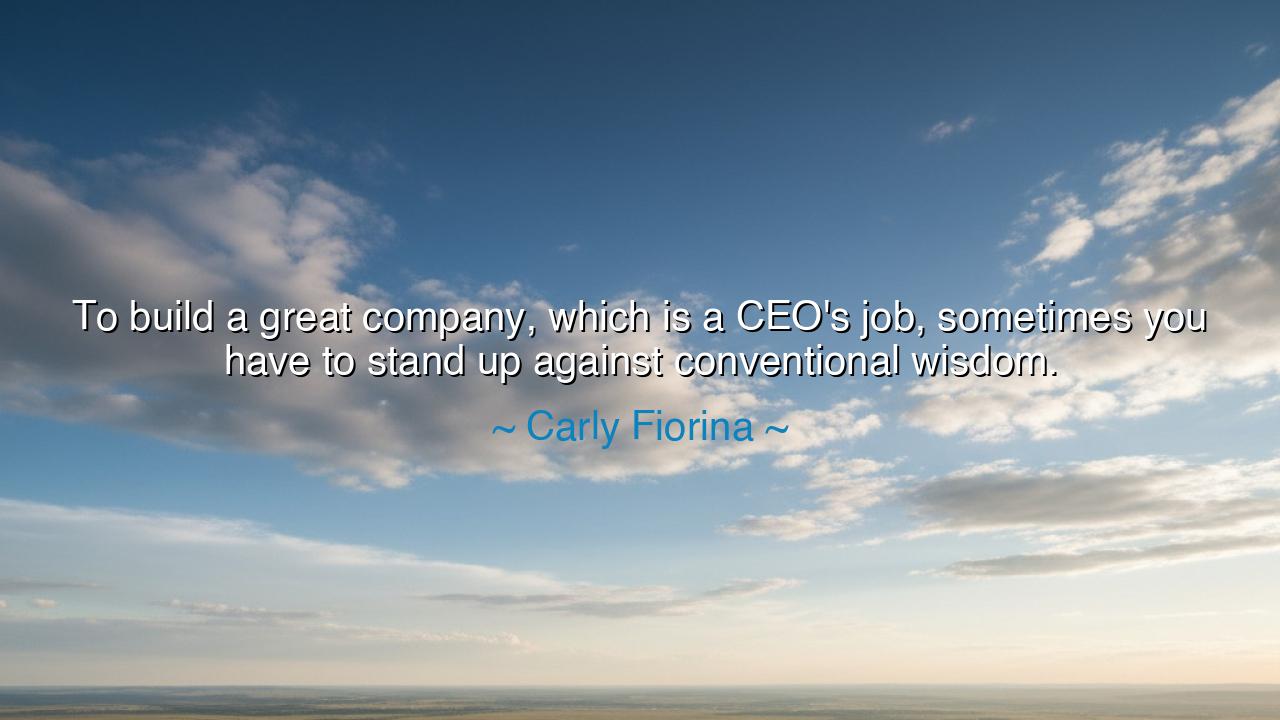
To build a great company, which is a CEO's job, sometimes you
To build a great company, which is a CEO's job, sometimes you have to stand up against conventional wisdom.






Hearken, O children of ambition and discernment, to the counsel of Carly Fiorina, who reveals the essence of leadership in the forging of greatness. She declares that to build a great company, the sacred task of a CEO, one must at times rise against the tide of conventional wisdom. Herein lies a lesson for all generations: progress and vision demand courage to challenge prevailing assumptions, to chart a course untraveled, and to act with both conviction and foresight.
The origin of this reflection lies in Fiorina’s life as a business leader and innovator, particularly during her tenure guiding large enterprises in the modern age. She observed that the path of leadership is not one of simple conformity, but of discernment, bold decision, and the willingness to confront entrenched beliefs. Conventional wisdom, while comforting, may obscure opportunity, and true leadership requires the courage to see beyond what others accept as immutable.
The meaning of this aphorism is profound: leadership is an exercise not merely of authority, but of vision and moral courage. To act in alignment with convention is safe, but to act in accordance with insight, even when it opposes popular thought, is the mark of a leader who shapes destiny rather than merely following it. The building of a great enterprise, whether of commerce, art, or governance, demands this interplay of insight and boldness.
History provides vivid testament to this teaching. Consider Steve Jobs, who, in the founding and shaping of Apple, often defied the prevailing wisdom of the marketplace. He championed products, designs, and strategies that others deemed foolish or impossible, yet through unwavering vision and courage, he transformed not only his company but entire industries. Here is the eternal lesson: greatness arises from those who challenge the comfortable assumptions of the present.
Moreover, this teaching extends to all who would create or lead. The scholar who pursues unorthodox research, the artist who defies stylistic convention, the statesman who proposes reforms beyond the bounds of popular thought—all enact Fiorina’s counsel. To stand against conventional wisdom is not arrogance, but the disciplined courage to pursue enduring excellence where others see only limitation.
O generations yet unborn, take this counsel into your hearts: seek to build greatness in your endeavors, and let courage guide you when the path diverges from the familiar. Challenge assumptions with insight, act with conviction, and remember that true leadership demands not acquiescence, but vision. In standing against conventional wisdom, you awaken the power to transform, to innovate, and to leave a legacy of enduring greatness.






NDQuy Nguyen Dinh
Reading this, I question whether the perception of conventional wisdom is always accurate. Sometimes widely accepted practices are based on real experience and expertise. How does a CEO distinguish between harmful tradition and valuable guidance? I also wonder about the personal traits required to stand up to conventional thinking—resilience, vision, risk tolerance, and communication skills. This statement encourages me to explore how leaders can inspire teams to follow unconventional paths without causing unnecessary disruption.
ANAnh Nguyet
This quote makes me think about the nature of business innovation. Are groundbreaking companies built primarily on creativity and intuition, or is standing against conventional wisdom just one part of a broader strategy? I also wonder how this principle applies outside of business—can similar lessons be drawn for leadership in politics, education, or non-profits? It prompts reflection on the balance between respect for proven methods and the courage to pursue new ideas.
TVThien Vu
I feel motivated by the idea that leadership requires independent judgment. Yet it also raises questions: how does a CEO discern which conventional ideas to challenge and which to respect? Does success in defying norms depend on timing, insight, or persuasive communication? The quote makes me reflect on personal and professional growth—how can one cultivate the confidence and discernment necessary to take calculated risks that deviate from mainstream thinking?
LTLinh Tran
This statement sparks reflection on organizational culture. I wonder how employees and stakeholders respond when a leader challenges established norms. Does standing against conventional wisdom inspire creativity and loyalty, or does it risk confusion and resistance? I also question whether there are limits to this approach—are there situations where adhering to conventional strategies might be wiser? It encourages me to think critically about balancing boldness with prudence in corporate decision-making.
VAnguyen van anh
Reading this, I’m intrigued by the tension between innovation and conventional thinking. I wonder how often CEOs who challenge norms succeed versus fail—does breaking from tradition require extraordinary vision, or is it mostly a calculated risk? I also question whether the ability to defy conventional wisdom is innate, or whether it can be cultivated through experience, mentorship, and exposure to diverse perspectives. This quote makes me think about leadership as both strategic and courageous.